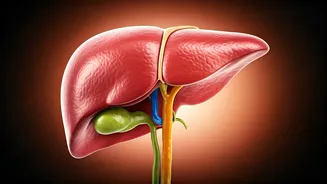Liver's Amazing Resilience
The liver is a remarkable organ, with an impressive ability to regenerate. Unlike many other organs, the liver can repair itself when damaged, even from
significant injury. This exceptional characteristic is a testament to its vital role in the body. However, while the liver is resilient, it's not invincible. Excessive alcohol consumption, a poor diet, and exposure to toxins can overwhelm its capacity to heal. This highlights the importance of supporting your liver through healthy lifestyle choices and being mindful of the factors that can negatively affect it. Therefore, treating your liver with care is crucial for maintaining its health and ensuring its longevity. Prioritizing its well-being can contribute significantly to your overall vitality and wellness.
Coffee: Liver's Ally
Coffee is often associated with energy boosts, but its impact on the liver is less widely known. Studies suggest that regular coffee consumption can actually benefit the liver. Coffee helps protect against liver diseases, including cirrhosis and liver cancer. It contains antioxidants that neutralize harmful free radicals, reducing inflammation. These antioxidants may also help lower the risk of developing conditions like fatty liver disease. Moreover, coffee can enhance the liver's ability to process toxins. The benefits are significant, suggesting that enjoying your daily cup of coffee may be a simple yet effective way to support your liver health and well-being. Moderate consumption seems to be key to reaping these benefits.
Fatty Liver: Common Concern
Fatty liver disease is becoming increasingly prevalent. It occurs when excess fat builds up in the liver, impairing its function. This condition is often associated with lifestyle factors. The buildup of fat can lead to inflammation and damage, potentially progressing to more severe liver problems. Risk factors for fatty liver include obesity, diabetes, and excessive alcohol consumption. Dietary choices, especially those high in processed foods and saturated fats, also play a significant role. Identifying the early signs of fatty liver is vital, and adopting healthier lifestyle habits like regular exercise, a balanced diet, and avoiding excessive alcohol can help prevent its development. Regular checkups can also aid early detection.
Everything You Consume
Your liver plays a vital role in processing everything you eat and drink. It acts as a filter, separating harmful substances from nutrients. The liver breaks down medications, metabolizes alcohol, and helps remove toxins from your body. Because of its processing duties, the liver is constantly at work. This continuous activity underscores its vulnerability to various substances. The liver is the first line of defense against the harmful effects of what we consume. Therefore, making conscious choices about what you eat, drink, and expose your body to is critical. By supporting the liver, you support your overall health and wellness. This also includes being mindful of the quantity of anything you ingest, as this affects the liver’s workload.
Sleep & Liver Health
Sleep and liver health have a surprisingly strong connection. The liver, like many other body functions, operates on a circadian rhythm. It has its own internal clock that regulates its functions. Poor sleep can disrupt this natural cycle and negatively affect liver function. Insufficient sleep can lead to increased inflammation and impair the liver’s ability to repair itself. Chronic sleep deprivation can worsen existing liver conditions. Establishing a regular sleep schedule, aiming for 7-8 hours of quality sleep per night, is essential for supporting optimal liver function. This includes creating a relaxing bedtime routine and avoiding screens before bed. Prioritizing sleep is a simple, yet powerful way to protect and enhance the health of your liver.
The Liver's Internal Clock
The liver is governed by its own internal clock, which is linked to the circadian rhythm. This internal clock influences various liver functions, including metabolism, detoxification, and repair. This internal timekeeping system works in sync with the body's overall sleep-wake cycle. Disrupting the circadian rhythm, through factors like irregular sleep patterns, shift work, or chronic stress, can affect the liver. Maintaining a regular sleep schedule and aligning your eating habits with your body's natural rhythms is beneficial. Supporting the liver's natural cycle helps promote efficient function and supports overall well-being. Understanding this relationship can help you make informed decisions to optimize your liver's health.
Hydration's Detox Role
Proper hydration is crucial for your liver's detoxification processes. Water helps the liver remove toxins and waste products from the body. It plays a pivotal role in flushing out harmful substances and ensuring that the liver can function efficiently. Inadequate hydration can strain the liver. Drinking enough water each day ensures the liver functions optimally. Aiming for a daily intake of at least 8 glasses of water will greatly support your liver's natural detoxification processes. Dehydration can hinder the liver's ability to cleanse the body, so staying adequately hydrated should be a daily priority. Including hydrating foods like fruits and vegetables further contributes to your overall hydration.
Supplement Safety Concerns
While supplements can provide health benefits, they are not always safe for the liver. Some supplements, particularly those containing high doses or certain ingredients, can put a strain on the liver. The liver is responsible for metabolizing supplements. This processing can lead to liver damage if the supplement is used incorrectly. Certain herbs and substances can be particularly harmful. Before starting any new supplements, it is best to consult with a healthcare professional to assess their safety and suitability for your liver health. Being mindful of the ingredients and dosages of the supplements you take can protect your liver from potential harm. Focusing on a balanced diet and a healthy lifestyle can often provide the same health benefits without the risks associated with certain supplements.
Hidden Liver Killers
Certain everyday habits and environmental factors can silently harm your liver. These 'liver killers' can gradually damage the organ without any immediate symptoms. Processed foods, excessive sugar intake, and exposure to environmental toxins are examples. Overconsumption of alcohol and certain medications can also be detrimental. Even household products, such as cleaning supplies and pesticides, contain chemicals that can burden the liver. Identifying and minimizing exposure to these harmful elements is crucial for maintaining liver health. Regular exercise, a balanced diet, and limiting exposure to toxins can support the liver. Awareness and proactive steps can make a significant difference in preventing liver damage and promoting long-term health.











